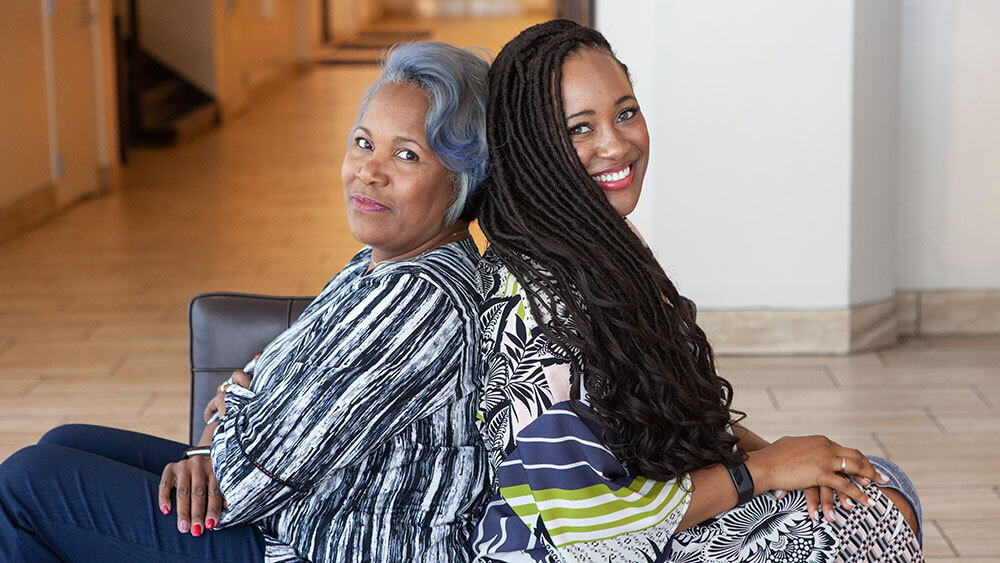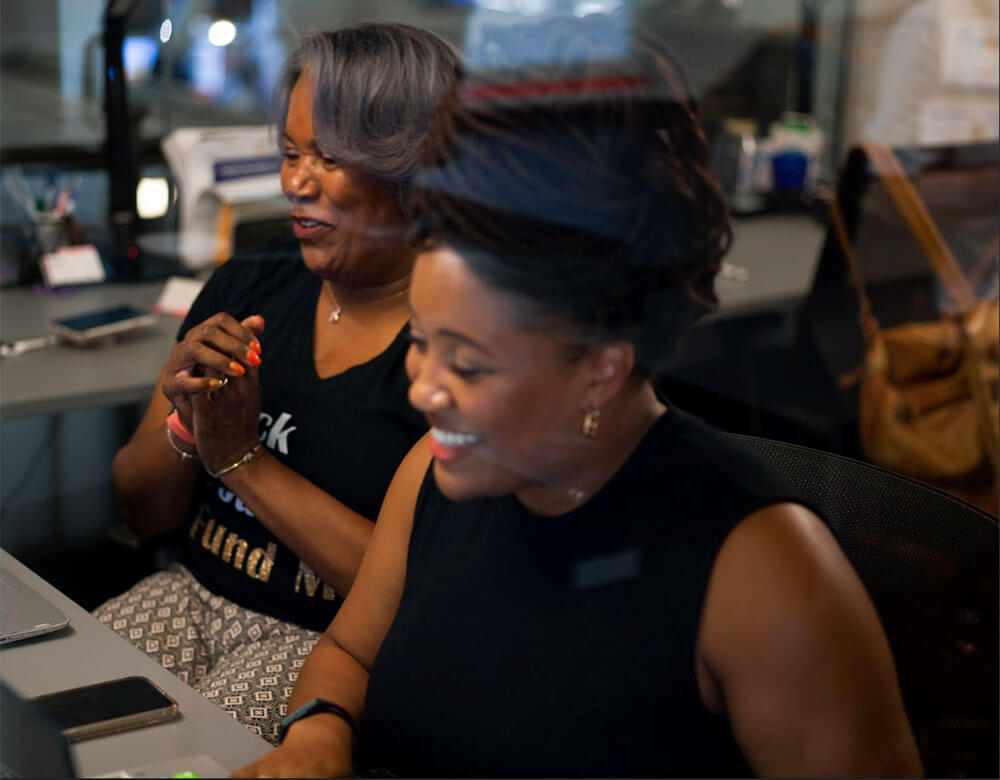
Ashlee Ammons (pictured) and her mother, Kerry Schrader, co-founded Mixtroz, an event-management software company, in 2014.
Editor’s note: PCMA Groundbreakers is an initiative honoring industry trailblazers who represent diverse sectors of the business events community, recognizing those who have made a significant contribution to their organizations and to programs that advance inclusion and equity. Conceived by PCMA’s Black Lives Matter Working Group, the honor helps to create a living history of pioneers in the business events industry.
When Convene called Ashlee Ammons at the scheduled time for her interview, she was nearing the end of a workout on the treadmill. “I just wanted you to know in case you hear me huffing and puffing — I’m not dying,” Ammons joked. “I didn’t want you to think, ‘Wow, this entrepreneur stuff is really taking a toll on her — she can barely breathe when she’s talking!’”
But it turned out just the opposite was true: Ammons becomes only more animated and passionate when speaking about Mixtroz, an event-management software company she co-founded in 2014 with her mother, Kerry Schrader. Ammons serves as president; Schrader is CEO. Mixtroz, a mashup of the words “mixer” and “introduction,” is a technology that can be used at in-person or digital events to help organizations and higher learning institutions create engaging breakouts for networking, teambuilding, and more — and was borne from Ammons’ and Schrader’s own unsuccessful adventures in networking at business events.
Years ago, Ammons went to an event, “and when I got there, the event organizer was like, ‘We’re going to do some networking today — go up to somebody with the same-colored dot on your name tag as you.’ And I was like, ‘That is very awkward.’ Because it was an all-women’s event. Women wear name tags on their chest 90 percent of the time. If you’re looking for a dot there, it’s super uncomfortable,” Ammons said. “And so I didn’t meet anybody.”
Ammons had a conversation with her mother — a longtime human resources executive familiar with the meetings circuit — later that evening about the lack of effective networking strategies at meetings.
“We’re just having this conversation about how there is a lot of software to get you to an event — to help you sign up. There is a lot of software to help you stay connected, be it social media or otherwise, but what is the software that forces the collision with the right people when you’re actually on site at the events? And we searched for things that solved that problem in the way that we were thinking about, and we couldn’t find anything.” That night, the idea for Mixtroz was created.
Ammons shared with Convene how she started in the events industry, what it’s like to be a leader in technology as a Black woman, and her experience working as part of a mother/daughter team.

After Ashlee Ammons (right) and her mother, Kerry Schrader, decided to launch Mixtroz, they faced a long road to getting funding and support for their company.
A ‘Non-traditional’ Start in Events
Originally from Cleveland, Ohio, Ammons attended Baldwin-Wallace University in Berea, Ohio, earning a degree in Mass Communications & Public Relations. During her time at the university, she was accepted for an internship that “really shaped the direction” of her career, she said, working as an associate for LRMR Ventures — basketball star LeBron James’ organization that handles branding, marketing, communications, and more for his businesses. This, she said, was the start of her “non-traditional” background working in events.
“That was when I got my first introduction to events because we were doing things like marketing summits — bringing all his brand partners to Ohio,” Ammons said. “It was a very interesting thing for me, at that age, to see.”
After graduating, Ammons was able to use the connections she made during her internship to land a position with global hospitality company TAO Group, based in New York City.
Starting out as executive assistant, Ammons worked her way up to director of events at the company after around five years. In this role, she produced major events, such as activations at the London Summer Olympics in 2012, moving on to producing events for brands like Nike, Moet Hennessy, and Coca-Cola while working at Strategic Group, a sister company of TAO Group.
“I’m a thorough believer that the best events experience you can get is doing, and it’s doing every single job that you’re going to come in contact with as you get to a more senior level, because it just helps you understand the way things are working. It helps you anticipate as things are going wrong. You can react in real time instead of trying to figure out the fault after the fact,” Ammons said. “That’s why if you want to get into events at any age — intern and apprentice, because [the industry is] constantly evolving, and there’s so many ways to solve one problem.”

Entrepreneurship should be colorblind, because anybody from anywhere can have an idea, and if the idea is valid, they should be able to push that idea forward.”
‘A Big Delta’ in Tech
When Ammons and Schrader decided to launch Mixtroz in 2014, they faced a long journey to getting the organization up and running. “We really started functioning like a business in 2018,” Ammons said, as funding for the project wasn’t easy to come by. In the early years of building the company, Schrader was on sabbatical — the first professional break of her career — and Ammons was still with Strategic Group until 2016, at which point she left New York to join her mother in Nashville, dedicating herself full-time to Mixtroz. “When we’re looking at people who were starting companies — white males — they were raising a million dollars. At the same stage, a Black female was raising $36,000,” Ammons said. “There is that big delta between how much people were raising at a certain stage, and my mom and I had no idea of this; we just thought people who are entrepreneurs are able to push it forward. We were just very naive.”
Funding the company was the result of “pounding the pavement,” Ammons said, something that paid off when Mixtroz was accepted into Alabama’s Velocity Accelerator program in 2018. Neither cofounder had visited the state before, but Ammons explained that their family history began in Alabama at a plantation outside of Birmingham. Her mother, Ammons said, “often says that we are indeed our ancestors’ wildest dreams.”
The mother/daughter team picked up from Nashville and moved their operation to Birmingham during the 14-week program. Throughout the program, Ammons said she and her mother “started to have a better understanding of our business” — what worked about it, what clients would love about it, and how they could better pitch it to raise funding.
That same year, a pitch competition hosted by former AOL CEO and chairman, Steve Case, serendipitously came through the Birmingham area. Ammons and Schrader won the competition, marking their first $100,000-investment into their company. Over the next six months, thanks to connections they had made in Birmingham, the team raised $1 million, making Ammons and Schrader the 37th and 38th Black female founders to raise $1 million or more in the United States. Even more notable: According to the National Center for Women & Information Technology (NCWIT), women only hold 25 percent of computing roles, and of that small percentage, Black women account for just three percent.
“We’re part of this, unfortunately, small cohort of women of color who have achieved that,” Ammons said. “We’re reducing the stigma, and changing the way that people invest. Women can do it, people of color can do it, LGBTQIA people can do it. Entrepreneurship should be colorblind, because anybody from anywhere can have an idea, and if the idea is valid, they should be able to push that idea forward. So we’re happy about that, but at the same time, it’s just very staggering.”
As a Black woman, Ammons found breaking into the tech industry particularly difficult. “People just used to — not so much anymore because of all of the societal things that have happened,” she said, referring to the Black Lives Matter movement, “but certainly before that, people just told us outright, ‘You are two Black ladies in the South, you can’t code, there is no way that you two are going to be able to get the funds.’”
Though Ammons thinks that their non-technical background was positive in creating their company “because we didn’t build with the tech constraints in mind,” repeatedly hearing these comments started to “suck the life” out of them, she said.
“Because after you hear ‘you can’t’ for so long, how long does it take before that actually starts to seep into your own psyche?” Ammons said. “I feel like things started to change when my mom and I stopped trying to fit into other people’s box of what they thought a tech entrepreneur was.”
For example, Ammons recalled a time when they avoided wearing their natural hair to make “older, white males comfortable when we walked into a room and asked them for funding.” The moment they started living authentically — “which is loud and bold; we’re talkative and we get along with everyone,” Ammons said — did their company start to take off. Soon, Mixtroz started landing customers like Amazon, Johns Hopkins University, and the Kellogg and Kauffman Foundations.
“To anybody who’s reading this, maybe from an underrepresented group and they’re trying to start something: Do not adjust for whatever the status quo is in that market. Be yourself, and everybody else can adjust to you.”

Kerry Schrader (left) and Ashlee Ammons appear on an episode of Google for Startups in 2019.
A Mother/Daughter Team
Throughout the years-long journey of building Mixtroz from the ground up, Ammons said there is no one she would’ve chosen to do it with other than her mother, who lends her experience in the corporate world to Ammons’ events background.
“I honestly hope she doesn’t read this because I don’t like complimenting her — it really goes to her head,” Ammons joked, “but she is the best person I know. My mom is someone in my life who has always had my best interests at heart, and I know that in my bones. And that is the person — the only person — that you can start a business with because starting a business is rough,” she said. “If I was doing it by myself, when things happened, good or bad, my mom is on the list of the top two people I would call first to explain the problem to, to seek advice from, to celebrate with. And so it’s pretty awesome that I don’t have to do that — because she’s usually there with me.”
Casey Gale is associate editor at Convene.
